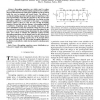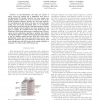543 search results - page 3 / 109 » Design of Decoupling Active Noise Control Systems |
ICCAD
2009
IEEE
13 years 5 months ago
2009
IEEE
Decoupling capacitance (decap) is an efficient way to reduce transient noise in on-chip power supply networks. However, excessive decap may cause more leakage power, chip resource...
ESWA
2007
13 years 7 months ago
2007
In this paper, adaptive neural network sliding-mode controller design approach with decoupled method is proposed. The decoupled method provides a simple way to achieve asymptotic ...
TVLSI
2008
13 years 7 months ago
2008
Decoupling capacitors are widely used to reduce power supply noise. On-chip decoupling capacitors have traditionally been allocated into the white space available on a die or place...
ASPDAC
2009
ACM
14 years 2 days ago
2009
ACM
— In three-dimensional (3D) chips, the amount of supply current per package pin is significantly more than in two-dimensional (2D) designs. Therefore, the power supply noise pro...
ISCA
2003
IEEE
14 years 20 days ago
2003
IEEE
Scaling of CMOS technology causes the power supply voltages to fall and supply currents to rise at the same time as operating speeds are increasing. Falling supply voltages cause ...


